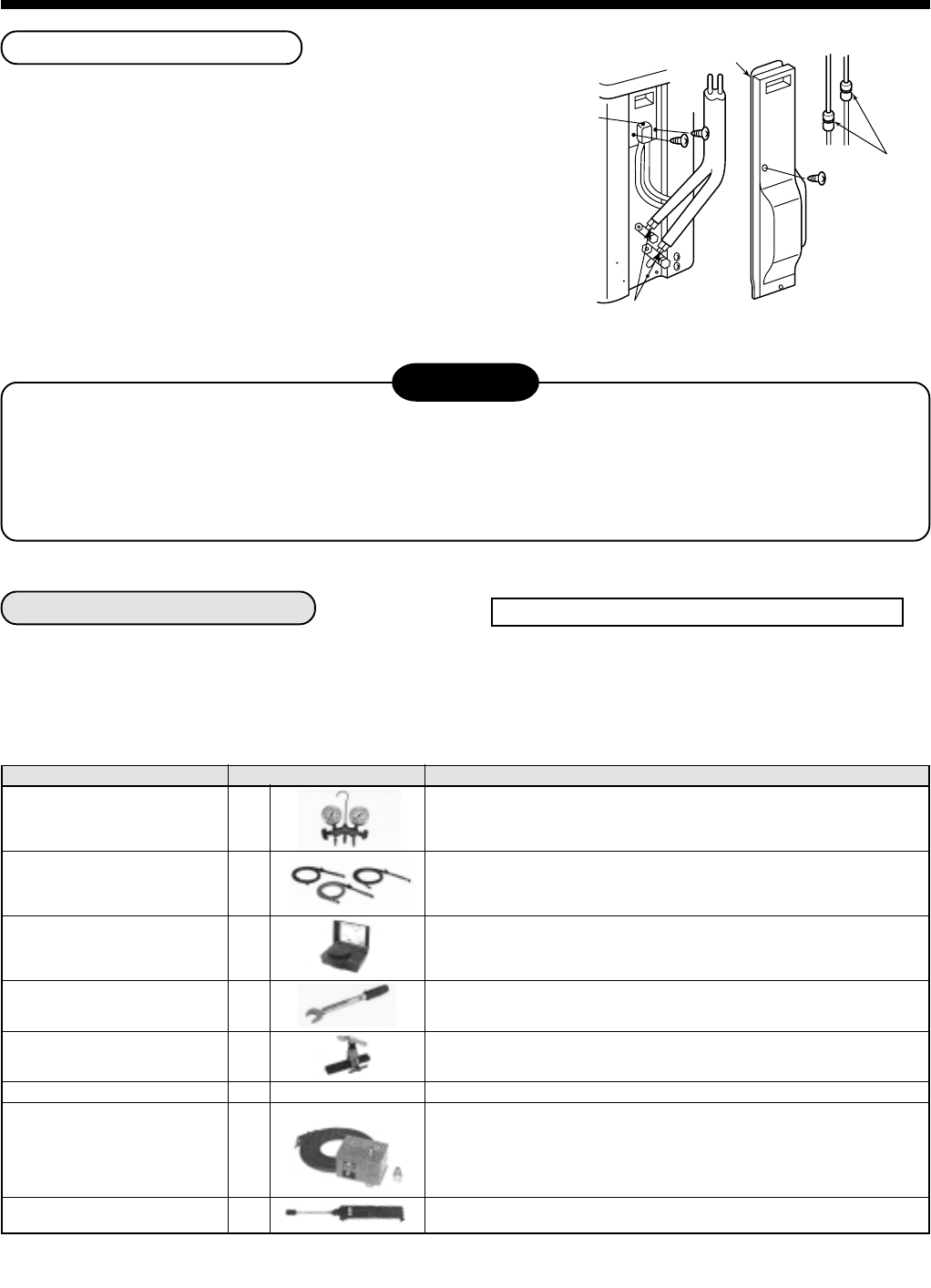
– 14 –
RAV-SM561AT-E, RAV-SM801AT-E
Valve cover
Check points
of outdoor unit
Piping
cover
Flare nut
connections
(Indoor unit)
7
FINAL INSTALLATION CHECKS
Check and Test Operation
For R410A, use the leak detector exclusively manufactured for
HFC refrigerant (R410A, R134a, etc.).
* The conventional leak detector for HCFC refrigerant
(R22, etc.) cannot be used because its sensitivity for HFC
refrigerant lowers to approx. 1/40.
• Pressure of R410A is approx. 1.6 times higher than that of R22.
If installation work is incompletely finished, a gas leakage may
occur when pressure rises during operation.
Therefore, be sure to test the piping connections for leakage.
• Check gas leakage at the flare nut connections, valve stem cap
connections and service port cap fittings with a leak detector or
soap water.
CAUTION
When the remote controller is used for the first time, it accepts an operation approx. 5 minutes after the power
supply has been turned on.
It is not a trouble, but is because the setup of the remote controller is being checked.
For the second power-ON time and after, approx. 1 minute is required to start the operation by the remote
controller.
Installation/Servicing Tools
Changes in the product and components
New tools for R410A
Gauge manifold
Charge hose
Electronic balance
for refrigerant charging
Torque wrench
(nominal diam. 1/2, 5/8)
Flare tool
(clutch type)
Gauge for projection adjustment
Vacuum pump adapter
Gas leakage detector
Applicable to R22 model
××
××
×
××
××
×
¡
××
××
×
¡
——
¡
××
××
×
X
Changes
As pressure is high, it is impossible to measure by means of conventional
gauge. In order to prevent any other refrigerant from being charged, each
port diameter is changed.
In order to increase pressure resisting strength, hose materials and port
size are changed (to 1/2 UNF 20 threads per inch).
When purchasing a charge hose, be sure to check the port size.
As pressure is high and gasification speed is fast, it is difficult to read the
indicated value by means of charging cylinder, as air bubbles occur.
The sizes of opposite sides of flare nuts have been increased. Inciden-
tally, a common wrench is used for nominal diameters 1/4 and 3/8.
By increasing the clamp bar’s receiving hole, strength of spring in the tool
has been improved.
Used when flare is made with using conventional flare tool.
Connected to the conventional vacuum pump. It is necessary to use an
adapter to prevent vacuum pump oil from flowing back to the charge hose.
The charge hose connecting part has two ports - one for conventional
refrigerant (7/16 UNF 20 threads per inch) and the other for R410A. If the
vacuum pump oil (mineral) mixes with R410A, sludge may occur and
damage the equipment.
Exclusive for HFC refrigerant.
In the case of an air conditioner using R410A, in order to prevent any other refrigerant from being charged accidentally,
service port diameter of the outdoor unit control valve (3 way valve) has been changed. (1/2 UNF 20 threads per inch)
• In order to increase the pressure resisting strength of the refrigerant piping flare processing diameter and size of
opposite side of flare nuts has been changed. (for copper pipes with nominal dimensions 1/2 and 5/8)
New tools for R410A
• Incidentally, the “refrigerant cylinder” comes with the refrigerant designation (R410A) and protector coating in the
U.S.’s ARI specified rose color (ARI color code: PMS 507).
• Also, the “charge port and packing for refrigerant cylinder” require 1/2 UNF 20 threads per inch corresponding to the
charge hose’s port size.


















